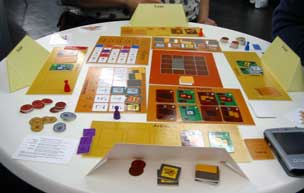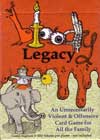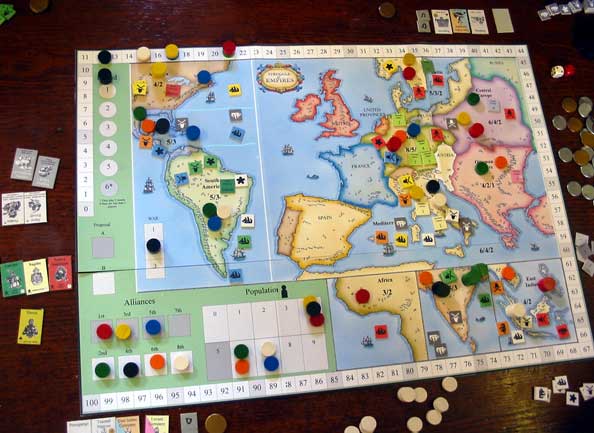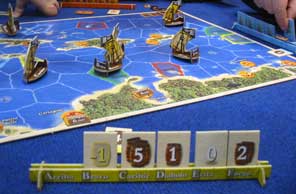|
|
|
Spiel í04 Ė page 4
Notes on the 2004 games fair by Pevans
|


|
|
 Sagacity Games Sagacity Games
The Australian publisher of
jigsaw game, Sunda to Sahul, showed the prototype of
designer Don Boneís latest creation: Imhotep. This is a
more conventional game of pyramid building. The players bid for
the materials needed to allow them to lay another piece on the
stepped pyramid. Itís an interesting game and I look forward to
seeing the finished version next year.
Splotter Spellen
Dutch publisher Splotter is known
for its big, complex games Ė with little dashes of humour. Their
new game, Antiquity is no exception. It comes in a huge
box and has hundreds of cardboard counters. Like other Splotter
games, this is a game of development and logistics. But there the
resemblance ends. In Antiquity players are developing and
expanding across the board. You start with a city, which takes up
space on the board and from which you send out expeditions to
explore and establish farms, logging camps and so on. These
provide the raw materials you need to expand further and develop
your city.
A separate grid is provided for
each city, on which you fit the buildings you need to fuel your
expansion Ė including houses for your workers. Another neat touch
is the way using the land changes it: cut down the trees and
forest becomes grassland. Plant crops and the land becomes worn
out. The winning condition depends on each playerís patron saint
Ė something that can be changed. And each saint provides a
special power to their followers. This game absolutely demands
that players plan ahead. The risk (for me anyway) is getting
sucked in to the intricate detail of managing your estates and
cities. Yes, itís definitely my kind of game.
Surprised Stare Games
 Bloody Legacy is a card game from a newish
British publisher, Surprised Stare Games, and is very much in the
Family Business and Kersplatt! mould. Or perhaps
Kind Hearts and Coronets was designer Tony Boydellís
inspiration. Players want to be the last surviving heir to a
fortune. Which means removing all the other claimants Ė that is,
eliminating the other players. So you play traps and try to dodge
the traps played on you. Lose too many points and youíre out of
the round and lose a life. Lose all your lives and youíre out
completely. Last man standing wins. Bloody Legacy is a card game from a newish
British publisher, Surprised Stare Games, and is very much in the
Family Business and Kersplatt! mould. Or perhaps
Kind Hearts and Coronets was designer Tony Boydellís
inspiration. Players want to be the last surviving heir to a
fortune. Which means removing all the other claimants Ė that is,
eliminating the other players. So you play traps and try to dodge
the traps played on you. Lose too many points and youíre out of
the round and lose a life. Lose all your lives and youíre out
completely. Last man standing wins.
This is a very silly game. Itís
also great fun! Yes, itís an elimination game, but itís over
quickly enough that nobody minds. And the action is fast and
furious Ė if someone takes too long reading their cards (to find
out what they are), it could be too late for them. A lightweight
bit of nonsense: I love it!
Tresham
Games
Apart from the launch of
Revolution by Phalanx Games, Francis Tresham was promoting
his own games at the show. The latest was 1825 Unit 3,
which expands the territory of the game into Scotland. On its
own, it is played as a two-player game and has a few special
features. It can also be combined with Units 1 and 2 to provide a
much bigger game over most of Britain.
Warfrog
Warfrog had their new game,
Struggle of Empires, stacked up on their stand. Iíve
already talked about this (in TWJO 47) and I found it even
better on second playing. While there are lots of things you
could do, an understanding of how the game works allows you to
concentrate on the options that make sense for your strategy. I
am sure that more strategies will emerge as people get to grips
with the subtleties of the game. I suggest limiting the game to
four players when youíre learning it, which makes things a bit
simpler.
 I have since tried a couple of
the Age of Steam expansions Warfrog had available. Both
have some changes from the basic game that mean they play a bit
differently. The Germany map (originally published by Winsome
Games last year) has lots of connections to other countries
around the edge. These are very useful destinations for goods,
but building the connections is seriously expensive. On the Korea
board, cities are not a set colour. Instead the goods at a city
set its colour(s) as a destination. Of course, as goods are
delivered, the available destinations change. This should make
for a more fluid game and provides some different tactics.
However, after the first few turns, I found a number of goods
were pretty much locked in place as stable destinations, so it
didnít seem to make much difference. Weíll see what happens next
time. I have since tried a couple of
the Age of Steam expansions Warfrog had available. Both
have some changes from the basic game that mean they play a bit
differently. The Germany map (originally published by Winsome
Games last year) has lots of connections to other countries
around the edge. These are very useful destinations for goods,
but building the connections is seriously expensive. On the Korea
board, cities are not a set colour. Instead the goods at a city
set its colour(s) as a destination. Of course, as goods are
delivered, the available destinations change. This should make
for a more fluid game and provides some different tactics.
However, after the first few turns, I found a number of goods
were pretty much locked in place as stable destinations, so it
didnít seem to make much difference. Weíll see what happens next
time.
Winning
Moves
I got to play both the new games
at Winning Moves. First up was Karibik, designed by
Mikhail Antonov and Jens-Peter Schliemann. My magpie eye drew me
to this game as soon as I saw it. Model galleons on a map of the
Caribbean dotted with gold bars! Okay, calm down, itís all just
cardboard. Players move the galleons to pick up treasure and
deliver it to their home port. The highest value of treasure at
the end wins the game.
 > The twist is that the player who
moves a ship is the one who bids highest. A tie means nobody
moves it. Since each player has the same set of chits to bid
with, this comes down to out-guessing your opponents. There are
opportunities for clever play, which enlivens the game. For
example, moving a ship alongside another allows you to steal the
treasure. So bidding high for a ship that isnít able to pick up
treasure from an island may give an opportunity for piracy. The
game is pleasant enough to play, but itís a family game rather
than a gamerís game. Rio Grande is publishing an English language
edition. > The twist is that the player who
moves a ship is the one who bids highest. A tie means nobody
moves it. Since each player has the same set of chits to bid
with, this comes down to out-guessing your opponents. There are
opportunities for clever play, which enlivens the game. For
example, moving a ship alongside another allows you to steal the
treasure. So bidding high for a ship that isnít able to pick up
treasure from an island may give an opportunity for piracy. The
game is pleasant enough to play, but itís a family game rather
than a gamerís game. Rio Grande is publishing an English language
edition.
Submarine, from Leo
Colovini, looks less exciting by comparison. The board is a cross
section of the sea, from surface to seabed. Spread across it are
lots of treasures (cardboard counters). The aim is to be the
first to collect all the different treasures. To do this, you all
have some nice little wooden submarines. Each player also has a
Ďmotherí ship on the surface and can only move or pick up with
their submarines when their mother ship is directly
overhead.
This sounds simple, but is
actually rather clever. If you simply move your submarines every
time your mother ship reaches them, youíll never pick up any
treasures. But if you pick up treasures, your mother ship moves
on and you canít do anything else with those submarines until the
mother ship comes across the board again. Other aspects of the
game are equally subtle, providing players with tactical
manoeuvres and the need to plan ahead. Submarine is not a
particularly deep game, but it is much more demanding than
appears at first.
Zoch
I still think of Zoch as the
masters of the wooden dexterity game, but they spread their wings
rather wider than that these days. Meisterdiebe (Master
Thief) is as much a puzzle as a game. Designed by Frank
Czarnetzki, the centrepiece of the game is a casket of drawers
that is manipulated and turned over by players. Depending on
their role, players are hiding and hunting for different Ďgemsí
in the drawers. A unique game.
More conventional is Franz-Benno
Delongeís Goldbršu. This has the players vying for control
of breweries and beer gardens during a beer festival (my kind of
game!). The income from the drinkers is shared between the bars
and the breweries, so both generate income for players. As well
as competing for ownership, players are also trying to get their
own management in place Ė particularly important for deciding
which brewery supplies which beer gardens. The heart of the game
is a simple card-playing mechanism. But winning the game is
rather more complicated. I like it Ė and not just for its subject
matter! An English language edition is due from Rio
Grande.
Niagara is aimed at
children, but is good fun for everybody. The game is played on
the box, using plastic discs set into a channel representing the
river. The discs carry wooden canoe pieces swirling down the
river towards the falls. Players are trying to manoeuvre their
canoes along the river to pick up a set of gems. And avoid going
over the falls. The game plays quickly and neatly. It was
designed by Thomas Liesching and Rio Grande is producing an
English language version.
Zugames
Another new publisher, this one
from Bologna in Italy. Zugamesí first game is Feudo,
designed by Mario Papini. At its heart, this is a simple wargame.
Players are medieval Barons, moving their knights, men-at-arms
and characters about the board. In this respect, the game feels
rather Chess-like. As well as fighting each other, players are
also trying to avoid the plague. The King provides a balancing
force, supporting the lowest-scoring players. The game is limited
by the number of turns and the winner is the player with the most
points at the end. It didnít seem particularly exciting from the
brief description I had, but itís interesting enough that Iíd
like to try it.
Ystari
Ystari is a new French publisher
and was at Spiel with its first game, Ys, and its
designer, Cyril Demaegd. The ancient city of Ys turns out to have
been circular and divided into three levels and four quarters.
The players are merchants, trading for gems. By manipulating the
prices of the different colours of gem, you aim to have the
highest monetary value at the end of the game.
Playing the game is about placing
brokers (markers of different values) in the twelve sections of
the city each turn. Having the highest value brokers in an area
gets you gems, extra cash or a special ability (cards). Players
also bid to change the relative values of the gems. And they bid
for turn order using one of their brokers Ė who is then not
available to place on the board. At first glance this is a clever
game with some subtlety that will repay repeated play. It is my
favourite of the games I played at Spiel.
Conclusion
Spiel í04 was an interesting
show. While no game really stood out, there were an awful lot of
good games to try. And even more were published earlier in the
year. The number of new publishers was also noticeable. This is
surprising as general wisdom has it that the games industry (in
Germany at least) has been in the doldrums in recent years. I
wonder if the new publishers have been stimulated by the
established companies producing fewer games? Whatever the reason,
itís good news for us games players. (One final point: why were
there so many pirate games at Spiel this year?)
Spiel í05 takes place at the
Messe (Exhibition halls) in Essen, Germany 13th-16th October
2005. It is organised by Friedhelm Merz Verlag and more
information can be found on the Friedhelm Merz Verlag website.
/ / / /
|